Heme prosthetic group - Study guides, Class notes & Summaries
Looking for the best study guides, study notes and summaries about Heme prosthetic group? On this page you'll find 144 study documents about Heme prosthetic group.
Page 4 out of 144 results
Sort by
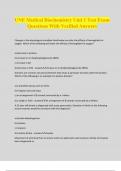
-
UNE Medical Biochemistry Unit 1 Test Exam Questions With Verified Answers
- Exam (elaborations) • 7 pages • 2024
- Available in package deal
-
- $11.49
- + learn more
UNE Medical Biochemistry Unit 1 Test Exam Questions With Verified Answers Changes in the physiological variables listed below can alter the affinity of hemoglobin for oxygen. Which of the following will lower the affinity of hemoglobin for oxygen? a) decrease in protons b) increase in 2,3 bisphosphoglycerate (BPG) c) increase in pH d) decrease in CO2 - answerIncrease in 2,3 bisphosphoglycerate (BPG) Domains are common structural elements that retain a particular function within the prote...
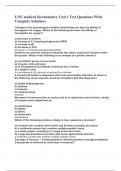
-
UNE medical biochemistry Unit 1 Test Questions With Complete Solutions.
- Exam (elaborations) • 5 pages • 2023
-
Available in package deal
-
- $10.49
- + learn more
UNE medical biochemistry Unit 1 Test Questions With Complete Solutions. Changes in the physiological variables listed below can alter the affinity of hemoglobin for oxygen. Which of the following will lower the affinity of hemoglobin for oxygen? a) decrease in protons b) increase in 2,3 bisphosphoglycerate (BPG) c) increase in pH d) decrease in CO2 Increase in 2,3 bisphosphoglycerate (BPG) Domains are common structural elements that retain a particular function within the protein. Whi...
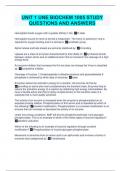
-
UNIT 1 UNE BIOCHEM 1005 STUDY QUESTIONS AND ANSWERS
- Exam (elaborations) • 9 pages • 2024
-
Available in package deal
-
- $11.49
- + learn more
Hemoglobin binds oxygen with a greater affinity in the: R state Hemoglobin bound to heme is termed a holoprotein. The heme or porphoryin ring is required for oxygen binding and it is termed a: prosthetic group Alpha helices and beta sheets are primarily stabilized by: H bonding Ligases are a class of enzymes characterized by their ability to: synthesize bonds between carbon atoms and an additional atom that is involved in the cleavage of a high energy bond. An enzyme inhibitor that i...

-
UNE BIOCHEM UNIT 1
- Exam (elaborations) • 3 pages • 2023
-
Available in package deal
-
- $9.69
- + learn more
UNE BIOCHEM UNIT 1 Domains are common structural elements that retain a particular function within the protein. Give an example fo a protein domain. An arrangement of Beta-strands connected by a-helices (BaBaBa) Define what a protein domain is A section os a protein structure sufficient to perform a particular chemical or physical task Chymotrypsin is a protease that cleaves peptide bonds. It is characterized as which of the following classes of enzymes? Hydrolases Hemoglobin bound to h...

-
UNE medical biochemistry Unit 1 Test Questions With Complete Solutions.
- Exam (elaborations) • 5 pages • 2024
-
- $11.49
- + learn more
UNE medical biochemistry Unit 1 Test Questions With Complete Solutions. Changes in the physiological variables listed below can alter the affinity of hemoglobin for oxygen. Which of the following will lower the affinity of hemoglobin for oxygen? a) decrease in protons b) increase in 2,3 bisphosphoglycerate (BPG) c) increase in pH d) decrease in CO2 Increase in 2,3 bisphosphoglycerate (BPG) Domains are common structural elements that retain a particular function within the protein. Whi...
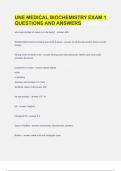
-
UNE MEDICAL BIOCHEMISTRY EXAM 1 QUESTIONS AND ANSWERS.
- Exam (elaborations) • 13 pages • 2023
-
Available in package deal
-
- $14.99
- + learn more
what percentage of water is in the body? 60% Relationship between protons and acids & bases Acids donate proton. Bases accept proton Strong Acids Vs Weak Acids Strong acids fully dissociate (100%) and weak acids partially dissociate properties of water dipole dipole polar H bonding dissolves electrolytes ( CL /Na) Small Kd- doesn't dissociate alot kw ion product 10^-14 pH -log[H+] biological PH 7.4 types of buffers phosphates, bicarbo...
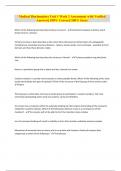
-
Medical Biochemistry Unit 1 Week 1 Assessment with Verified Answers| 100% Correct| 100% Score
- Exam (elaborations) • 2 pages • 2024
- Available in package deal
-
- $6.49
- + learn more
Medical Biochemistry Unit 1 Week 1 Assessment with Verified Answers| 100% Correct| 100% Score Which of the following best describes tertiary structure? - Interactions between α-helices and β sheets to form a domain. Tertiary structure is best described as the entire three-dimensional conformation of a polypeptide including how secondary structural features - helices, sheets, bends, turns and loops - assemble to form domains and how these domains relate. Which of the following best descr...
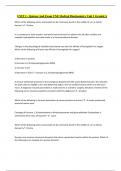
-
UNIT 1 - Quizzes And Exam UNE Medical Biochemistry Unit 1 Graded A
- Exam (elaborations) • 40 pages • 2024
-
Available in package deal
-
- $9.49
- + learn more
UNIT 1 - Quizzes And Exam UNE Medical Biochemistry Unit 1 Graded A Which of the following amino acid would not be commonly found in the middle of a an α-helical domain? ️Proline. It is considered a 'helix breaker' and would not be found in an alpha helix; all other residues are nonpolar hydrophobic and could reside in a transmemebrane domain. Changes in the physiological variables listed below can alter the affinity of hemoglobin for oxygen. Which of the following will lower the...
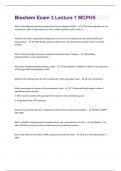
-
Biochem Exam 3 Lecture 1 MCPHS Questions With Answers Graded A+ Assured Success
- Exam (elaborations) • 4 pages • 2024
- Available in package deal
-
- $7.99
- + learn more
What is the difference between ubiquinone (Q) and ubiquinol (QH2) - Q is fully oxidized so it has no electrons, QH2 is fully reduced so it has 2 more electrons and H+ than Q What are the other sequentially acting electron carriers in the respiratory chain besides NAD and flavoproteins - Hydrophobic quinone (ubiquinone, Q), Cytochrome (contain iron), Iron-sulfur proteins What is the final stage of cellular respiration and where does it happen - Oxidative phosphorylation, in the mitochondria...
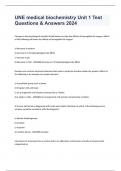
-
UNE medical biochemistry Unit 1 Test Questions & Answers 2024
- Exam (elaborations) • 8 pages • 2024
-
Available in package deal
-
- $8.49
- + learn more
UNE medical biochemistry Unit 1 Test Questions & Answers 2024 Changes in the physiological variables listed below can alter the affinity of hemoglobin for oxygen. Which of the following will lower the affinity of hemoglobin for oxygen? a) decrease in protons b) increase in 2,3 bisphosphoglycerate (BPG) c) increase in pH d) decrease in CO2 - ANSWER-Increase in 2,3 bisphosphoglycerate (BPG) Domains are common structural elements that retain a particular function within the protein. W...

Study stress? For sellers on Stuvia, these are actually golden times. KA-CHING! Earn from your study resources too and start uploading now. Discover all about earning on Stuvia


